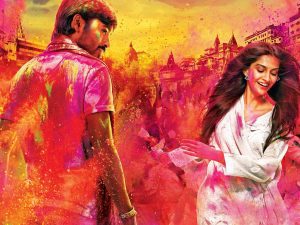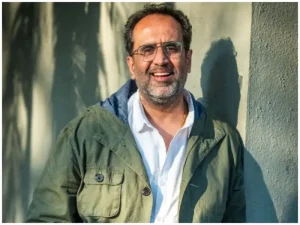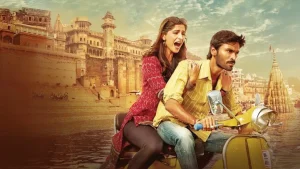Director Aanand L. Rai Voices Strong Disapproval Over AI-Generated Alteration to Raanjhanaa’s Original Tragic Ending
Celebrated filmmaker Aanand L. Rai has firmly rejected the AI-modified ending to his 2013 romantic tragedy Raanjhanaa, calling the creative intervention unjustified and emotionally dishonest. The new version, scheduled to re-release in Tamil Nadu on August 1, replaces the film’s tragic climax with a happy ending, generated using artificial intelligence.
The decision, announced by producers Eros International, has ignited what is now being widely referred to as the Raanjhanaa AI controversy. Rai, who directed the film from a script by Himanshu Sharma, said the change undermines the film’s emotional foundation and disrespects the years of effort poured into its creation.
“No one approves of this,” Rai stated in an interview with Zoom. “How can you suddenly change a story that took years to build? A character is not just written; it is lived through by an actor. You cannot wipe that journey away with an AI prompt.”
Also Read : Malcolm‑Jamal Warner Dies at 54 While Vacationing in Costa Rica: A Look at His Life, Career, and Legacy

Lead Actors Dhanush and Sonam Kapoor Also Share Concerns About the AI-Induced Narrative Revision
While neither of the film’s stars—Dhanush and Sonam Kapoor—has officially commented, Aanand L. Rai disclosed that they, too, were displeased by the revision. He emphasized that actors invest significant time and emotional energy to bring depth and authenticity to their characters. According to Rai, altering the film’s original conclusion not only dilutes the narrative but also disrespects the artistic dedication of its cast.
Rai elaborated, “There is a reason why a film like Raanjhanaa ends the way it does. The story belongs to the tragedy genre and changing the ending compromises the purpose behind telling it. You cannot just decide one day that no one dies and everyone lives happily ever after.”
Production House Eros International Defends the Use of AI as a Creative Expansion, Not a Replacement
In response to the backlash, Eros International issued a statement defending their creative decision. The studio acknowledged Aanand L. Rai’s criticism but insisted that the altered version is legally sound and was created with the intent of engaging newer audiences.
According to the production house, the AI-generated happy ending is not meant to replace the original but to offer an alternative viewing experience. The studio likened it to director’s cuts or remastered editions and asserted that their legal rights permit such reinterpretations.
“We respect the director’s vision,” a spokesperson from Eros said, “but as content owners, we are also committed to exploring innovative formats to expand the film’s reach.”

AI Modification Raises Broader Concerns About Artistic Ownership, Legacy, and Ethical Storytelling in Indian Cinema
The Raanjhanaa AI controversy has raised critical questions across the Indian film industry about artistic integrity and creative control. Should studios be allowed to use AI to modify completed films without involving original creators? Is it ethical to reinterpret a story’s ending simply to make it more commercially viable?
For Rai, the answer is a clear no. “You are erasing the essence of storytelling when you tamper with its conclusion,” he said. “There are emotions and intentions behind every scene. Changing the ending alters everything the audience has emotionally invested in.”
This isn’t just about one film. Industry insiders fear that this could set a precedent where commercial interests override artistic merit, with AI used recklessly to modify finished work for modern sensibilities or wider distribution.
Audience Reactions to the AI Version of Raanjhanaa Remain Divided, Sparking Intense Discussion Across Social Media Platforms
The re-release of Raanjhanaa in Tamil Nadu—under its dubbed title Ambikapathy—with the AI-altered happy ending has split audience opinion. Some fans welcomed the innovation, hoping it might provide closure for the film’s heartbroken viewers. Others condemned the move as disrespectful to the film’s original form and message.
The divide has played out intensely across social media, with hashtags like #RaanjhanaaAI trending on X (formerly Twitter). Many users called the change “unnecessary,” while others questioned whether AI should ever be used to revise creative works after release.
This reaction only intensifies the Raanjhanaa AI controversy, underscoring how audiences, too, are protective of artistic authenticity and storytelling integrity.
Could the Raanjhanaa AI Controversy Influence How AI Is Used in Indian Cinema?
The ripple effect of this controversy may influence how studios approach AI in filmmaking going forward. While technology continues to offer possibilities—from restoration to personalization—the incident has spotlighted the ethical and creative boundaries that should guide its use.
Filmmakers and actors across Bollywood are closely watching the Raanjhanaa AI controversy to see how it evolves. The backlash could prompt studios to re-evaluate how they handle legacy content, especially when using new technologies like generative AI.
According to industry experts, this moment might push for new agreements or industry norms that protect the creative rights of directors and actors in perpetuity.

Raanjhanaa’s Legacy Sparks Debate Over AI’s Role in Modern Storytelling and Artistic Consent
The Raanjhanaa AI controversy is more than a creative dispute—it’s a flashpoint in the evolving relationship between art and technology. It questions the future of storytelling, challenges the boundaries of artistic ownership, and brings to the forefront the importance of creator consent.
As Raanjhanaa returns to theatres in its AI-modified form, it remains to be seen whether the new version resonates with audiences—or whether they, like the film’s original team, reject the change in favor of preserving its original vision.

